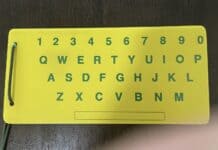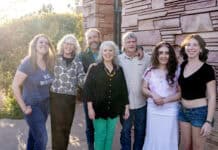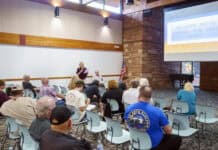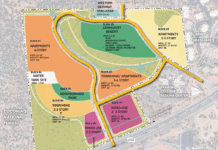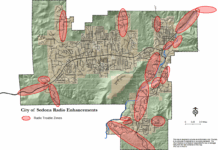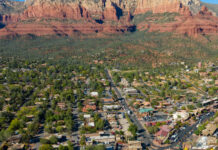
Two years ago the Sedona City Council approved a Conditional Use Permit to construct a 1.5-million-gallon water tank near the intersection of State Route 179 and Mallard Drive. But a lawsuit filed by a resident near the proposed site resulted in the project being put on hold.
The item will be back before the Sedona Planning and Zoning Commission on Tuesday, May 18, as a result of Coconino County Superior Court judge’s order.
By the 4-1 vote in October 2018, the Sedona Planning and Zoning Commission approved a Conditional Use Permit request from Arizona Water Company for a mostly subterranean water tank and booster pump station to provide water to the properties along the State Route 179 corridor.
An appeal could be made in writing within 15 days of the commission’s decision, which resident Vincent McGeary did.
In January 2019, Sedona City Council heard an appeal regarding the construction of the water tank. By a unanimous vote, council voted to uphold Planning and Zoning’s decision, thus denying McGeary’s appeal.
McGeary argued that the scale of the proposed water tank as presented by the applicant was “industrial,” with a “chemical storage and feed system” that were not appropriate in a residential neighborhood.
McGeary then filed a special action complaint in the Coconino County Superior Court in which he alleged that the commission and council’s decisions were arbitrary, capricious or contrary to law. Nearly two years after the case was fully briefed and submitted to the Superior Court judge for consideration, the court found that there was insufficient information in the record of the commission and council’s proceedings from which to draw any conclusion as to the legal sufficiency of the commission and council’s actions.
That said, the matter now comes before the commission for rehearing — by order of the court — to express in detail the requisite findings in the Sedona Land Development Code to support granting a conditional use permit.
In his filing, McGeary states he will be impacted by the construction of the industrial facility, including but not limited to increased traffic, noise and dust caused by excavation and construction activities. In addition, he feels he will be impacted due to the elimination of residential buildable lots in the area in which the property is located and in property value diminution during construction and thereafter.
He also alleges that city staff was biased in terms of its desire to see a water tank built in that area.
“Prior to Arizona Water Company’s purchase of the property, the city desired the construction of a water storage and treatment facility on or near the property,” McGeary’s court filing argues. “On information and belief, prior to [Arizona Water Company’s] purchase of the property, the director and [Community Development] Department knew of AWC’s plan to purchase the property for the purpose of building the plant. The department communicated to AWC its support of AWC’s plan to purchase the property and construct the plant and aided and abetted the AWC in its effort to secure the CUP.”
The court remanded the matter back to the commission and council to make further findings from which any future legal challenge could be objectively analyzed.
“In short, the court held that the motion made and passed by the commission at the Oct. 16, 2018, public hearing was insufficient and needs more detailed clarification,” the report states.
The court specifically held that the commission should “explain their factual and legal basis for their decisions approving the subject CUP, to include reference to the applicable LDC provisions that they considered and based their decisions upon.”
In this rehearing, the commission is asked to review the evidence as presented to the commission in August and October of 2018, along with any supplemental material that may be necessary to update the commission on the current status of the applicant’s project, then to articulate its findings accordingly.


